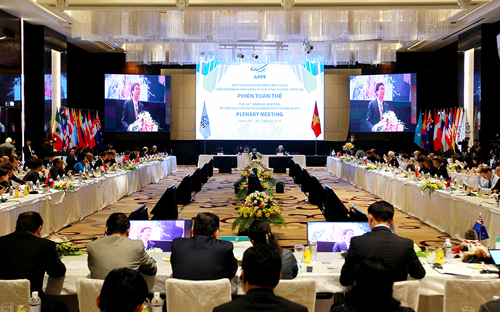Participants at the 26th Asia Pacific Parliamentary Forum on Saturday agreed that there is an urgent need for APPF members to establish a legal framework, institutions, policies and priorities for resources to respond to climate change, in line with international treaties, conventions, protocols and agreements.

Addressing the 3rd plenary session of APPF on Regional Development Cooperation Issues, Việt Nam’s Deputy Prime Minister Vũ Đức Đam emphasised the cross-borders impacts of climate change on people throughout the world.
“Climate change and rising sea levels are no longer a potential danger, but actually exist. The summer of 2017 in Hà Nội witnessed record heat temperatures, compared to the past 40 years; and if the sea level rises by one metre, it would severely impact some 40 per cent of the Mekong River Delta, where 12 million tons of rice is produced, as some 10-12 per cent of Việt Nam’s population would suffer and 10 per cent of our GDP would be lost,” Đam said.
He added that many parts of the world have witnessed abnormalities in the weather, with increased natural disasters.
“It is predicted that temperatures in the Asia-Pacific region will increase by 0.5 to 2 degrees Celsius by 2030. Climate change is caused not only by industries, but also by agriculture production and daily activities, not only by the use of chemicals, but also from our living habits,” he said.
Thus, apart from setting the proper legal framework for working to combat climate change, concerned countries should also invest in the elimination of fossil fuels, developing renewable energy and seeking to create low-carbon economies and encourage green growth.
Change can only be achieved through the synergy of the entire society, with every citizen knowing about climate change and starting from daily activities.
Therefore, it is necessary to have solutions to mobilise financial resources and strengthen public-private partnerships, along with the important role played by international financial institutions, which must be taken into account, according to Đam.
Representing the Vietnamese delegation, vice chairman of the National Assembly Uông Chu Lưu proposed that lawmakers promote the APPF’s role in assisting in the implementation of work for national programmes on responding to climate change; strengthening the development of policies, international law and monitoring law enforcement related to climate change; and creating priorities for the allocation of resources and funding that responds to climate change in economic development and major national investment projects.
Filipino Senator Loren B. Legarda, chairperson of the Senate Committee on Foreign Relations and the Senate Committee on Climate Change, stressed that the entire Asia-Pacific region would not achieve sustainable development without addressing the impact of climate change.
“Asia is the place that will suffer the most severe losses in the world, both in terms of human lives and the economy, because of natural disasters,” she said.
“Parliaments of the APPF members need to cooperate, share their experiences, provide research about the ways forward and come up with a legal framework for climate change so that Asia-Pacific, from areas heavily affected by natural disasters, can become self-reliant in responding to natural disasters,” she added.
Geng Tan, a member of the Canadian Parliament, said that climate change was a global problem that affected not only the present, but also future generations. Thus, combating climate change required global synergy.
"Evidence of the science of climate change is very clear: If we don’t address global warming, we will have to pay very high prices. We can fight climate change through global agreements, such as the Paris agreement. So the whole world needs to join this fight against climate change," he said.
Lee Jin-Book, head of the South Korean delegation, warned of floating rubbish islands that caused the deaths of many animals because they think such waste is food. He called for the reduction of waste found in the sea to protect the environment, and also called on nations to join with Korea for the common good.
In the third working day of the Asia-Pacific Parliamentary Forum, delegates also talked about ways to foster cultural and tourism cooperation in the region, and discussed resources to be used for sustainable development.
The final session will see the announcement about the host country of the APPF-27, along with the adoption of Resolutions and a Joint Declaration, followed by the closing ceremony.
Founded in Tokyo, Japan in 1993, the APPF brings together 27 members, including Australia, Cambodia, Canada, China, Chile, Colombia, Costa Rica, Ecuador, Fiji, Indonesia, Japan, Laos, Malaysia, the Marshall Islands, Mexico, Micronesia, Mongolia, New Zealand, Papua New Guinea, Peru, the Philippines, the Republic of Korea, Russia, Singapore, Thailand, the United States and Việt Nam.
The APPF is a mechanism that enables parliamentarians to discuss issues of common concern, and to deepen their understanding of the region and the interests and experience of its diverse members. The forum’s proceedings address political, security, economic, social and cultural issues, thus furthering regional cooperation and building relations between and among parliamentarians from the Asia-Pacific region. — VNS